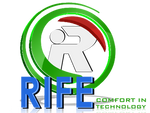RFID Solutions for Hospitals: Transforming Healthcare Efficiency and Asset Management
Introduction to RFID in Healthcare
Radio Frequency Identification (RFID) technology has revolutionized various industries, and healthcare is no exception. RFID solutions for hospitals are streamlining operations, improving patient care, and enhancing overall efficiency. From RFID medical asset tracking to RFID healthcare logistics, these technologies ensure seamless hospital operations while reducing costs and human errors.
Hospitals rely on sophisticated inventory and asset management systems to track everything from medical devices to patient movement. RFID-based solutions provide real-time data and visibility into hospital operations, making them a critical tool for modern healthcare facilities.
Understanding RFID Technology in Hospitals
RFID technology utilizes electromagnetic fields to identify and track tags attached to objects. These tags can be passive, active, or semi-passive, depending on their power source and data transmission capabilities. In hospital settings, RFID tags are attached to assets, equipment, medications, and even patient wristbands to enable automated tracking and monitoring.
Components of an RFID System in Healthcare
- RFID Tags – Attached to assets, equipment, and patients for tracking purposes.
- RFID Readers – Scanners placed strategically to read tag data.
- RFID Software – Integrates with hospital management systems to provide real-time updates.
- Cloud-Based or On-Premise Data Storage – Stores, processes, and analyzes data.
Benefits of RFID Solutions in Hospitals
1. Enhanced RFID Medical Asset Tracking
Hospitals deal with thousands of medical assets, from ventilators to infusion pumps. RFID hospital asset tracking ensures that medical devices are accounted for, reducing losses and improving accessibility.
- Quick identification of misplaced or stolen equipment.
- Reduced downtime due to missing tools.
- Lower costs by preventing redundant purchases.
2. Efficient RFID Hospital Equipment Management
Managing medical equipment is critical to hospital operations. RFID hospital equipment management ensures that essential devices are available when needed, preventing unnecessary delays in patient care.
- Tracks equipment utilization rates.
- Monitors maintenance schedules and alerts staff.
- Prevents unauthorized usage or theft.
3. Optimized RFID Healthcare Supply Chain
Healthcare facilities depend on a steady supply of medications, medical devices, and consumables. RFID healthcare supply chain management ensures efficient procurement, storage, and distribution of supplies.
- Real-time tracking of inventory levels.
- Prevents overstocking or understocking of critical supplies.
- Reduces waste by ensuring first-expiry-first-out (FEFO) management.
4. Improved RFID Patient Tracking System
RFID patient tracking systems enhance patient safety by monitoring movement within a hospital. RFID wristbands ensure that patients receive the correct treatments, medications, and care at the right time.
- Reduces patient misidentification errors.
- Improves security for high-risk patients (e.g., infants, elderly, psychiatric patients).
- Enhances workflow efficiency by providing real-time location updates.
5. Accurate RFID Medication Management
Errors in medication administration can have serious consequences. RFID medication management minimizes these errors by ensuring that the right medications reach the right patients.
- Automates prescription tracking and dispensing.
- Reduces medication theft and counterfeiting.
- Improves compliance with regulatory standards.
6. Seamless RFID Surgical Instrument Tracking
Surgical procedures involve numerous instruments that need to be tracked and sterilized. RFID surgical instrument tracking ensures that every tool is accounted for before and after a procedure.
- Prevents retained surgical items in patients.
- Automates sterilization tracking and compliance.
- Reduces instrument misplacement and loss.
7. Streamlined RFID Hospital Inventory Control
Managing hospital inventory manually is time-consuming and prone to errors. RFID hospital inventory control automates stock monitoring, ensuring accurate inventory levels.
- Reduces manual inventory checks.
- Prevents shortages of essential medical supplies.
- Enhances transparency in inventory management.
8. Real-Time Monitoring with RFID Real-Time Location System (RTLS)
Hospitals require real-time data to optimize workflows. RFID real-time location systems (RTLS) provide instant location updates on equipment, staff, and patients.
- Improves response times for emergencies.
- Enhances staff efficiency by reducing time spent searching for equipment.
- Ensures compliance with infection control protocols by tracking movement.
9. Effortless RFID Hospital Asset Tracking
Medical assets such as wheelchairs, stretchers, and oxygen tanks are frequently misplaced. RFID hospital asset tracking eliminates these issues by enabling automated asset management.
- Improves asset utilization rates.
- Reduces theft and loss.
- Provides real-time asset availability updates.
10. Optimized RFID Healthcare Logistics
Efficient logistics management is essential for hospital operations. RFID healthcare logistics enables better coordination of deliveries, patient transportation, and inventory replenishment.
- Ensures timely supply chain deliveries.
- Reduces bottlenecks in hospital workflows.
- Enhances communication between departments.
Future of RFID in Healthcare
1. AI-Driven RFID Systems
Artificial intelligence (AI) integration will further enhance RFID capabilities, enabling predictive maintenance, automated alerts, and smart inventory forecasting.
2. Blockchain Integration for Secure Data
Blockchain can be integrated with RFID to ensure secure and tamper-proof patient records, medication logs, and asset management.
3. IoT-Enabled Smart Hospitals
The Internet of Things (IoT) will work alongside RFID to create fully connected hospitals where devices communicate seamlessly.
4. 5G-Enabled RFID for Faster Data Transmission
With the rollout of 5G, RFID systems will benefit from real-time data transmission, improving hospital response times and efficiency.
5. Enhanced Wearable RFID Solutions
Future RFID wearables will offer real-time patient monitoring, alerting healthcare providers to critical changes in patient conditions.
Conclusion
RFID solutions are transforming hospital operations, improving efficiency, and enhancing patient safety. From RFID medical asset tracking to RFID healthcare logistics, these technologies streamline inventory management, equipment tracking, and patient care. As RFID technology continues to evolve, its role in the healthcare industry will only expand, driving hospitals towards smarter, more automated, and highly efficient environments.
Hospitals that adopt RFID technology today will be better prepared for the future, ensuring seamless operations, reducing costs, and ultimately improving patient outcomes.
